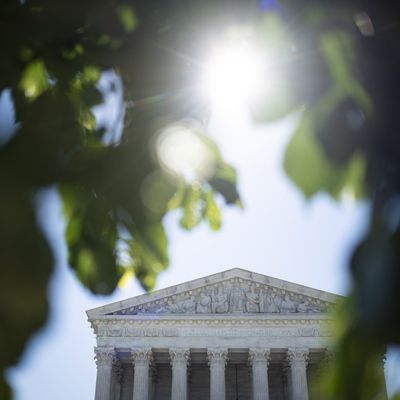
LGBTQ workers can breathe a little easier thanks to the U.S. Supreme Court. In a surprise 6-3 verdict, the court ruled that Title VII of the Civil Rights Act of 1964 does protect gay, lesbian, and transgender workers from employment discrimination. “Those who adopted the Civil Rights Act might not have anticipated their work would lead to this particular result,” Neil Gorsuch wrote for the majority. “Likely, they weren’t thinking about many of the act’s consequences that have become apparent over the years, including its prohibition against discrimination on the basis of motherhood or its ban on the sexual harassment of male employees. But the limits of the drafters’ imagination supply no reason to ignore the law’s demands.”
Monday’s verdict unquestionably hands LGBTQ workers a significant victory. Until now, they had to hope their city or state passed laws protecting them from discrimination at work. They lacked federal protections on the basis of sexual orientation or gender identity, which meant that a worker fired for being gay or trans had little recourse after the fact. Employer prejudice could easily plunge an LGBTQ worker into poverty — as it did for Aimee Stephens, who filed one of the three lawsuits the court collectively ruled on today, and who died before she could see the conclusion to her fight.
As a direct result of Monday’s ruling, LGBTQ workers can now take legal action if an employer fires them for discriminatory reasons. “If you believe you were fired because you are gay or lesbian or transgender, you will now have the ability to have an administrative complaint or also have a lawsuit,” explained Andrew Stettner, a senior fellow at The Century Foundation. But weak labor laws can allow employers to flout the spirit, if not the letter, of the law. To truly protect LGBTQ people — and women, and people of color — from discrimination at work, lawmakers will have to reconsider the existing balance of power between worker and boss.
The American boss enjoys immense power over the lives of his workers. At-will employment is one of the clearest examples of this imbalanced relationship at work. In at-will states, employers have the right to fire workers for nearly any reason — barring discrimination on the basis of sex or race. For this reason, collective bargaining agreements for unionized workers usually include just-cause provisions. Just-cause means that employers have to prove a pattern of poor performance over time, which gives workers a chance to improve before they lose their jobs. For vulnerable workers, just-cause is an important barrier to discrimination. Federal law already prohibits an employer from firing someone because she’s pregnant, but in the absence of just-cause, he can cite performance issues, or budget cuts, or the generic need for a new corporate direction, and show her promptly out the door.
“Then a worker has to assert that, ‘Oh, I think you’ve discriminated against me because I’m black, or because I’m gay or lesbian.’ But you’ve still lost your job, and you’re now fighting to get it back or to get some financial restitution,” Stettner said. That can burden workers who don’t have the independent means to hold their former employers accountable. Some politicians have advanced proposals that would ban at-will employment and replace it with something resembling just-cause language. During his primary campaign for president, Senator Bernie Sanders included the idea in his labor platform.
But Monday’s verdict will still have a deterrent effect on employers, said Suzanne Goldberg, who co-directs Columbia Law School’s Center for Sexuality and Gender Law. (Goldberg filed an amicus brief in the bundled cases.) “Today’s decision does not mean a complete end to discrimination against LGBT workers, but it does mean that employers are on notice that continuing to discriminate is unlawful and may be very costly,” she pointed out.
“The hope is that employers will take this decision as an incentive to ensure that their workplace environment is free from all forms of discrimination, because of any type of discrimination interferes with people’s ability to do their work,” she added. “This is true for racial discrimination, for sexual harassment, for LGBT discrimination, for discrimination against people with disabilities, or discrimination on religious grounds. This ruling is one piece of a much broader fabric that shapes employers responsibilities to their workers.”






























